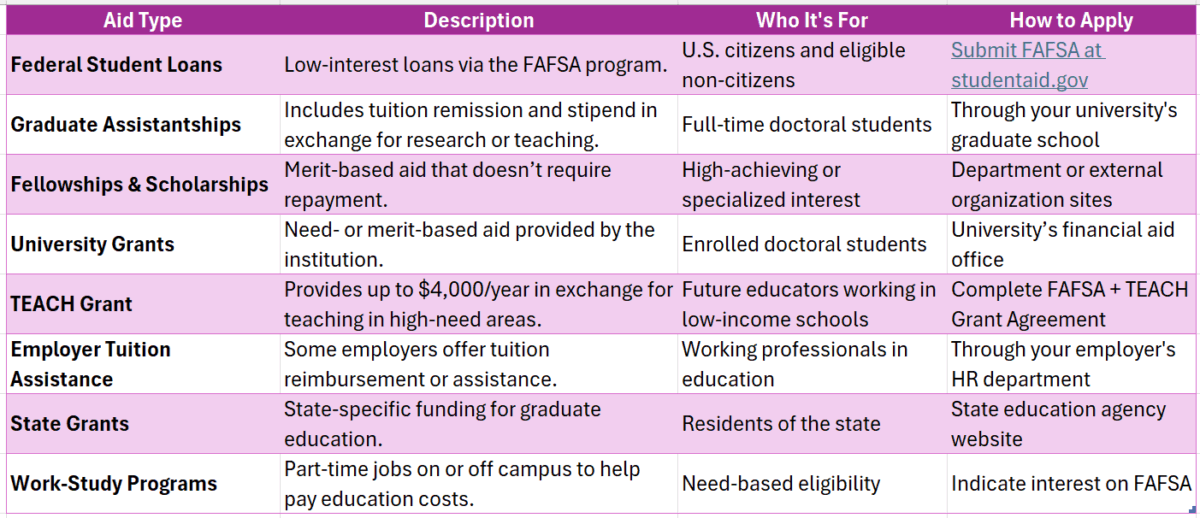
Understanding whether a doctorate in early childhood education is right for you is crucial. This advanced degree can open doors to leadership roles, research opportunities, and specialized teaching positions. But is it the right path for your career goals? Let’s explore the value of this degree.
Benefits of a Doctorate in Early Childhood Education
- Leadership Opportunities: With a doctorate, you can lead educational programs and influence policy.
- Specialization: You can focus on areas like a doctorate in special education, enhancing your skills to support diverse learners.
- Research Contributions: Engage in meaningful research that shapes early childhood education practices.
Pursuing a doctorate in education administration can also be a great choice. It prepares you for administrative roles, allowing you to impact educational systems at a higher level. Ultimately, the decision should align with your passion for education and your career aspirations.
Study smarter, not harder—Enroll online today!
Is a Doctorate in Early Childhood Education Worth the Investment?
Deciding whether a doctorate in early childhood education is worth the investment can feel overwhelming. Many educators wonder if the time, effort, and money spent on this advanced degree will truly pay off. This decision is crucial, as it can shape your career and impact the lives of countless children.
Benefits of a Doctorate in Early Childhood Education
- Career Advancement: With a doctorate, you can qualify for higher positions, such as university faculty or educational administrators.
- Specialization Opportunities: You can focus on areas like special education or education administration, tailoring your expertise to meet specific needs in the field.
- Increased Earning Potential: Advanced degrees often lead to higher salaries, making the investment worthwhile in the long run.
Ultimately, the choice depends on your career goals and passion for early childhood education. If you aspire to lead, innovate, or conduct research, pursuing a doctorate in early childhood education could be a fulfilling path. Remember, it’s not just about the degree; it’s about the impact you can make!
Career Opportunities with a Doctorate in Early Childhood Education
Choosing to pursue a doctorate in early childhood education can open many doors in your career. It’s not just about teaching; it’s about shaping the future of education. With this advanced degree, you can dive into various roles that impact young learners and their families.
Diverse Roles Await You
A doctorate in early childhood education can lead to exciting career paths, such as:
- University Professor: Teach future educators and influence educational practices.
- Educational Consultant: Help schools improve their early childhood programs.
- Program Director: Oversee early childhood education programs and ensure quality standards.
Additionally, if you have a passion for special needs, a doctorate in special education can complement your skills, allowing you to support diverse learners effectively. You might also consider a doctorate in education administration to take on leadership roles in educational institutions. In summary, a doctorate in early childhood education not only enhances your knowledge but also expands your career opportunities, making a significant impact on the lives of children and families.
How a Doctorate in Early Childhood Education Enhances Teaching Skills
When considering whether a doctorate in early childhood education is right for you, it’s essential to understand how this advanced degree can enhance your teaching skills. This degree not only deepens your knowledge but also equips you with innovative strategies to engage young learners effectively. Let’s explore how this journey can transform your teaching approach.
Advanced Knowledge and Skills
A doctorate in early childhood education provides you with a comprehensive understanding of child development theories. You’ll learn about:
- Effective teaching methods
- Curriculum development
- Assessment techniques This knowledge empowers you to create a rich learning environment that caters to diverse needs, making you a more effective educator.
Leadership Opportunities
Moreover, pursuing a doctorate in education administration or a doctorate in special education opens doors to leadership roles. You can lead educational programs, mentor fellow teachers, or even influence policy decisions. This leadership experience not only enhances your resume but also allows you to make a significant impact on the education system.
The Impact of a Doctorate in Early Childhood Education on Policy and Advocacy
Deciding whether a doctorate in early childhood education is right for you can be a big step. This advanced degree not only deepens your knowledge but also empowers you to influence policy and advocate for young learners. Understanding its impact is crucial for anyone passionate about shaping the future of education.
Shaping Educational Policies
A doctorate in early childhood education equips you with the skills to influence educational policies. You can advocate for better funding, improved curriculum standards, and inclusive practices. This is especially important for children with special needs, where a doctorate in special education can also play a vital role.
Leading Change in Communities
With a doctorate, you can lead initiatives that promote early childhood education in your community. You’ll be prepared to work with local governments and organizations, ensuring that every child has access to quality education. Additionally, a doctorate in education administration can help you manage these programs effectively.
What to Expect from a Doctorate in Early Childhood Education Program
When considering a doctorate in early childhood education, it’s essential to understand what the program entails. This advanced degree can open doors to various career paths, from teaching to administration. But is it the right fit for you? Let’s explore what you can expect from such a program.
Core Curriculum and Specializations
In a doctorate in early childhood education, you’ll dive deep into topics like child development, educational psychology, and curriculum design. You might also have the option to specialize in areas like a doctorate in special education or a doctorate in education administration. This flexibility allows you to tailor your studies to your interests and career goals.
Hands-On Experience
Expect a blend of theoretical knowledge and practical experience. Many programs include internships or research projects, giving you real-world insights. You’ll collaborate with educators and policymakers, enhancing your understanding of the educational landscape. This experience is invaluable as you prepare to impact young learners’ lives.
Balancing Work and Study: Pursuing a Doctorate in Early Childhood Education
Pursuing a doctorate in early childhood education can be a rewarding journey, but it also requires careful consideration. Balancing work and study is crucial, especially for those already in the field. Understanding the demands of a doctorate in early childhood education can help you decide if it’s the right path for you.
Time Management is Key
Managing your time effectively is essential. Here are some tips to help you balance your responsibilities:
- Set a Schedule: Create a weekly plan that includes study time, work commitments, and personal time.
- Prioritize Tasks: Focus on what’s most important each day to avoid feeling overwhelmed.
- Stay Organized: Use tools like calendars or apps to keep track of deadlines and assignments.
Benefits of a Doctorate
A doctorate in early childhood education opens many doors. Consider these benefits:
- Career Advancement: It can lead to higher positions in education administration.
- Specialization Opportunities: You can also explore areas like a doctorate in special education.
- Impact on Policy: With advanced knowledge, you can influence early childhood education policies.
Study smarter, not harder—Enroll online today!
Exploring Financial Aid Options for Your Doctorate in Early Childhood Education

Deciding whether a doctorate in early childhood education is right for you involves many factors, including financial considerations. Understanding your financial aid options can make this journey more accessible and less daunting. After all, investing in your education is a significant step toward shaping young minds.
Exploring Financial Aid Options
When pursuing a doctorate in early childhood education, various financial aid options can help ease the burden. Here are some avenues to consider:
- Grants and Scholarships: Many organizations offer financial support specifically for education degrees, including those focused on special education or education administration.
- Federal Student Loans: These loans often have lower interest rates and flexible repayment plans, making them a viable option for many students.
- Assistantships and Fellowships: Some universities provide opportunities to work as teaching or research assistants, which can cover tuition costs while gaining valuable experience.
By exploring these options, you can find the right financial path to support your educational goals and ultimately make a difference in the lives of children.
How Scholarship.Education Can Support Your Journey to a Doctorate in Early Childhood Education
Choosing to pursue a doctorate in early childhood education is a big decision. It can open doors to advanced teaching roles, research opportunities, and leadership positions. But how do you know if it’s the right path for you? At Scholarship.Education, we’re here to help you navigate this journey with ease.
Tailored Guidance for Your Goals
We understand that every student has unique aspirations. Whether you’re interested in a doctorate in special education or a doctorate in education administration, our expert advisors can help you find the right program that fits your needs. We offer personalized consultations to discuss your career goals and educational interests.
Resources and Support
At Scholarship.Education, we provide a wealth of resources to support your academic journey. From access to research materials to networking opportunities with professionals in the field, we ensure you have everything you need. Plus, our community forums allow you to connect with fellow students and share experiences, making your journey less daunting.
Is Now the Right Time to Pursue a Doctorate in Early Childhood Education?
Deciding whether to pursue a doctorate in early childhood education is a big step. It’s not just about the degree; it’s about your passion for shaping young minds. If you’re wondering if now is the right time, let’s explore some key factors together.
Consider Your Career Goals
Think about where you see yourself in the future. A doctorate in early childhood education can open doors to leadership roles, research opportunities, or even teaching at the university level. If you’re also interested in special education or education administration, a doctorate can provide the expertise needed for those paths too.
Evaluate Your Current Situation
- Time Commitment: Do you have the time to dedicate to your studies?
- Financial Readiness: Are you prepared for the costs involved?
- Support System: Do you have family or friends who can support you during this journey?
If you answered yes to these questions, now might be the perfect time to take the plunge!
Study smarter, not harder—Enroll online today!
FAQs
1. What is a Doctorate in Early Childhood Education?
It’s the highest academic degree focused on research, policy, and leadership in early childhood learning and development.
2. What are the common types of doctorate degrees in this field?
The most common are the Ph.D., which is research-oriented, and the Ed.D., which focuses more on practical leadership and policy application.
3. How long does it take to complete the program?
Typically, 3 to 5 years, depending on the program format, full-time or part-time enrollment, and dissertation completion.
4. What are the admission requirements?
Requirements often include a master’s degree, professional experience in education, letters of recommendation, a statement of purpose, and sometimes GRE scores.
5. What careers can I pursue with this degree?
Graduates often become college professors, early childhood education administrators, policymakers, researchers, or curriculum developers.
6. Can I earn this degree online?
Yes, many universities offer fully online or hybrid doctoral programs in early childhood education.





